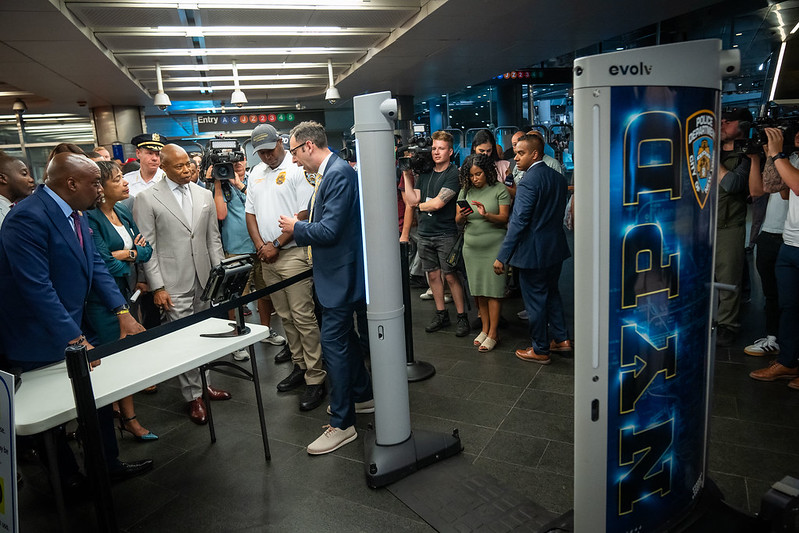How much is good PR worth? For Mayor Adams, the answer is evidently a lot higher than many of us thought.
With Adams’ controversial bid to install scanners in the subway from a scandal-plagued startup, New Yorkers are asking new questions about just how the self-avowed tech enthusiast goes about selecting the technology he pushes on the public. And we’re still waiting for credible answers from Hizzoner about what lines he isn’t willing to cross.
You’ve probably seen the headlines already: NYPD officials rolling out a gleaming subway scanners, promising this gadget will finally guarantee public safety. But once you look beyond the technological theatrics, it’s confusing why anyone, let alone the mayor and NYPD, would think this is a credible policy.
First, the project’s price tag is staggering. Just one Evolv detector costs $125,000 to rent for four years, enough to buy dozens of metal detectors from other vendors. The mayor was quick to brag about how he saw this as a step to a day when “every turnstile is going to be able to identify if someone is carrying a gun,” but he didn’t mention that outfitting the thousands of turnstiles across NYC this way would cost hundreds of millions of dollars.
Spending a fortune for metal detectors that not only do nothing to improve the safety of crowded platforms where New Yorkers can be pushed, but which appear to be bad at even detecting the weapons they’re made to find.
The scanners in question are manufactured by a controversial startup called Evolv, which, according to lawsuits, evolved its own marketing claims beyond what the facts supported.
The company made a big splash a few years ago with claims that its AI software could detect weapons in ways that defied belief…largely because they couldn’t. That’s at least according to the lawsuits from shareholders alleging the company defrauded investors by making promises that its tech couldn’t keep.
Independent audits from researchers at the security publication IPVM were able to pull the curtain back on the scandal, showing how the so-called “AI” in Evolv’s sensors wasn’t nearly as intelligent as advertised. Rather than using sophisticated software to identify weapons, the system was simply looking for metal tubes. Sure, metal tubes are in gun barrels, but they’re also in laptop hinges, umbrellas, and countless other everyday items.
The result is a scanner that isn’t much better than the much cheaper metal detectors that New Yorkers already know would be a nightmare to install in the subway, turning the morning train ride into an agonizingly slow TSA checkpoint.
And investors aren’t the only ones pushing back against the sketchy scanners. Federal officials, including the Securities and Exchange Commission and Federal Trade Commission, all set their sights on the company.
And those who’ve come face-to-face with Evolv in public aren’t much more positive about the firm. In a recent lawsuit, one New York student whose school uses Evolv sued the company, claiming their scanners failed to find the weapon that was used to attack him.
This is all part of a pricy policing pattern from the mayor, who has spent his time in office messaging the public safety publicity by rolling out one stunt after another. But the costs of these stunts are becoming unbearable — not only the money wasted on a scandal-plagued startup — but the impact these schemes have on New Yorkers, eroding our rights and invading our lives, with nothing to show for it.
These metal detectors mean more stops, more frisks, and more threat of police violence. The mayor may think of them as a harmless stunt, but the harm to New Yorkers who have to fear an invasive, error-prone scan and frisk just to get to school or work is so much greater than even the massive amounts of dollars wasted on the effort.
It’s time for Adams to admit what the rest of us already know: Subway scanners are an evolutionary dead end.
Cahn is the founder and executive director of the Surveillance Technology Oversight Project, or S.T.O.P., a New York-based civil rights and privacy group. Weber is a senior at Barnard College, majoring in political science, human rights, and ancient studies. She was a summer communications intern at the Surveillance Technology Oversight Project (S.T.O.P.).
